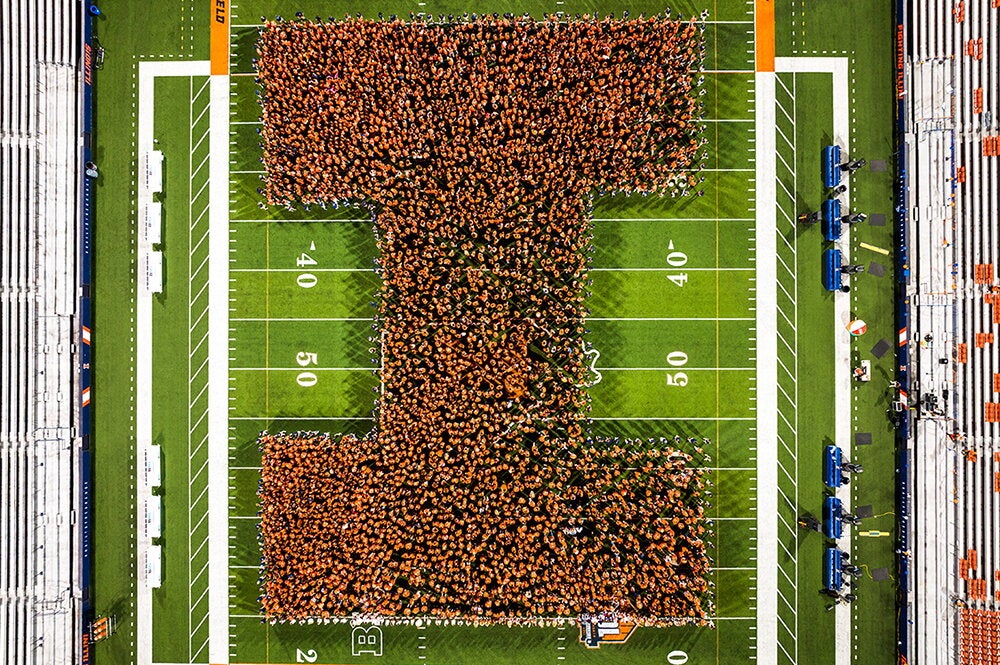

Real-time monitoring of indoor air quality, creating scholarly gaming environments, and developing sustainable solutions for cities are among the projects funded in the Discovery Partners Institute’s (DPI) first round of seed grants.
As part of establishing its academic and research activities, DPI announced nine recipients of its first round of seed funding awards, including three headed by professors in the College of LAS. These projects represent the types of work that DPI will undertake, seeking solutions to grand challenges that produce real-world impact.
DPI is a pioneering new research institute led by the University of Illinois System that will create breakthrough discoveries to drive economic growth and prosperity in Chicago, the state of Illinois, and beyond. Currently operating in downtown Chicago, DPI plans to construct a facility in the South Loop that will be home to thousands of students and more than 100 top researchers who will work alongside academic, business, and tech partners in the city and around the world.
All of the projects will receive funding, staff support and use of the DPI facility in Chicago — intended to fuel development of these early-stage initiatives into full-scale research and education programs.
The funded projects were selected from 46 submissions and feature topics central to DPI’s academic and research mission, such as artificial intelligence, quantum computing, educational pathways, urban resilience, and environmental determinants of health. All proposals were reviewed by leaders from across the U of I System, DPI leadership, and members of working groups that are developing DPI themes and cross-cutting areas.
The three LAS projects are listed below:
Air quality in the home: from smart sensing to action
Richard B. Sowers, professor of mathematics; Paul Francisco, senior coordinator at the Applied Research Institute; and Charles Catlett, the University of Chicago
This proposal aims to develop the technology for real-time monitoring of indoor air quality, building on a collaboration with the Indoor Climate Research & Training group at Urbana-Champaign’s Applied Research Institute and the Chicago Array of Things team. The project will produce a proof of concept, a data stream and prototype dashboard, an understanding of data analytics and a literature review, and a workshop discussing the findings.
Developing “scholarly gaming environments” via digital conservation of African cultural heritage
Teresa Barnes and Mauro Nobili, professors of history; Laila Hussein Mustafa, professor in the International Area Studies Library
This group seeks to create innovative educational materials in gaming and/or virtual reality formats as vehicles for research, teaching and engagement, while conserving digital versions of vulnerable African sites and materials. Funding will provide for two workshops to gather interested faculty and industry partners who will discuss the direction of the project.
Activating the Center for Urban Resilience and Environmental Sustainability (CURES)
Donald Wuebbles, professor of atmospheric sciences; Amy Ando, professor of agricultural and consumer economics; Timothy Lindesey, senior advisor at the Smart Energy Design Assistance Center; Anne-Marie Hanson at the University of Illinois - Springfield; and Elizabeth Kocs and Thomas Theis at the University of Illinois – Chicago
CURES aims to develop sustainable solutions for cities to improve community-wide health and prosperity. It will focus on strategies and policy tools to build resilience to climate change, promote human welfare, and address the interdependence of urban water, food, and energy. CURES will utilize DPI seed funding to establish core infrastructure, including its initial leadership team, website, and communication capabilities. Funding also will be used to curate CURES’ analytical capacity, carry out an initial pilot study with MMC, and host meetings with potential partners, research stakeholders, and funding sources.


